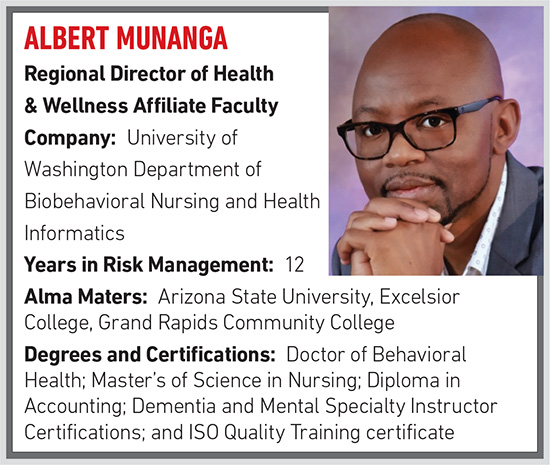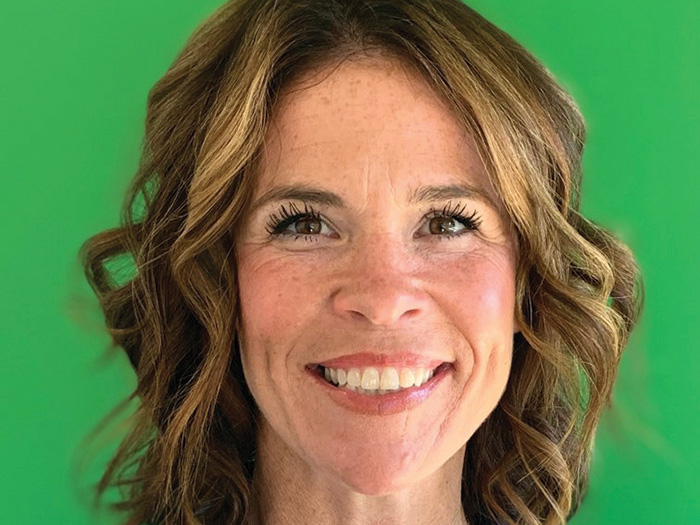This Nursing Home Risk Manager Shares His Story, from His Days as a Nursing Assistant to the Realities of COVID-19

R&I: What was your first job?
So, my first job was an assistant accountant and a quality auditor in Zambia, I worked for DHL, like FedEx, DHL International.
My first job in the United States was actually as-a nursing assistant, a caregiver. I rose through the ranks and I’ve done pretty much everything in the long term care setting. Between retirement and skilled nursing facilities, I’ve pretty much done almost any management job, in one fashion or another.
R&I: How did you come to your current position?
I rose through the ranks from being a nursing assistant, to being a licensed nurse, resident care supervisor, director of staff development, executive director and now regional director for health, wellness and compliance.
R&I: What’s been the biggest change in risk management and the insurance industry since you’ve been in it?
There’s just a need to understand those we serve more. I present at professional conferences as a speaker, and one of my favorite topics to present is customer service. When I say customer service, usually it’s risk management to me.
I think the biggest challenge, we’re dealing with a much more informed consumer population, especially the Baby Boomers. They’re very confident; they’re not shy about saying what they want; they don’t have the victim’s mentality. They’ll speak up for themselves. We’re in an age of a lot of information out there for everyone to see, so it does require excellence on our end.
R&I: What’s the biggest challenge you’ve faced in your career?
It’s when you have somebody wanting to come and live with you in your retirement community, and you know your community provides excellent care services, and somehow it’s not within their budget and you have to turn them away to seek sub–standard care elsewhere.
It just breaks your heart, because, most of these folks, they’ve traveled many miles ahead of us, they worked hard, and we inherit a country that they’ve worked hard for. To not be able to make sure that most seniors get the best care they need can be heartbreaking. I guess economic forces tend to allow for discrimination, in a way, if you will, here.
R&I: How did you go about addressing the risks Era Living faced at the onset of COVID-19?
I do remember very well that, when the news was breaking out of China,, I started preparing my teams. On February 11th, I did an education session and I said, ‘We must begin to follow what’s happening.’ And I remember saying that I didn’t want anybody to be surprised, if this unknown novel coronavirus comes to the United States, that there may be mandatory mask use.
I told my teams, I brought them together, and we started to prepare so that we don’t panic. Because I said, ‘One of the biggest things that will happen is we will panic.’ So we were prepared.
R&I: Who has been your mentor(s) and why?
Tim McCoy, our chief financial officer at Era Living, has been a major influence on me in terms of risk management. He has helped me shape my perspective and to think proactively and to play out the worst–case scenario and assume that was the most likely to occur.
R&I: What is the risk management community doing right?
I think that, in general, all of us that are in this community are paying particular attention to learning the evolving nature of the COVID information, related information, and making the needed adjustments as we go, because things keep shifting.
In some cases, I was talking to some of my friends in the industry, we don’t even always follow the CDC recommendations immediately if we question them, because at times we know there could be political influence. And we know the CDC sometimes comes back and reclassifies, or takes away, a particular recommendation.
R&I: What could the risk management community be doing a better job of?
I think risk management is a terminology that might put some people off. It’s fine, but I think getting us to talk more about risk management in a way that is customer service friendly, internally and externally because, like I said, good customer service really enhances and improves outcomes.
R&I: How would you say technology has impacted the risk management profession?
Well, I think that, of course, information is available, more quickly, so that is helping us to find resources, reference materials, quickly, but also speeding up communication.
An example I can give you is the technology, we’re trying out a software program where we load the data of folks with symptoms on a daily basis. Instead of having that information on paper or on a spreadsheet, it’s loaded in a software. If anybody, somewhere, enters information that is outside normal limits, then it triggers for somebody to see that.
R&I: What have you accomplished that you are proudest of?
Besides marrying my dream wife, I have just written a book called New Rules of Engagement: Infection Control in Group Settings, and there’s a lot of risk management there, so I’m proud of that book. But I’m also very proud of a program, what I call CQI, an interdisciplinary, quality, continuous quality improvement tool that I created and is interdepartmental, it’s comprehensive. &










